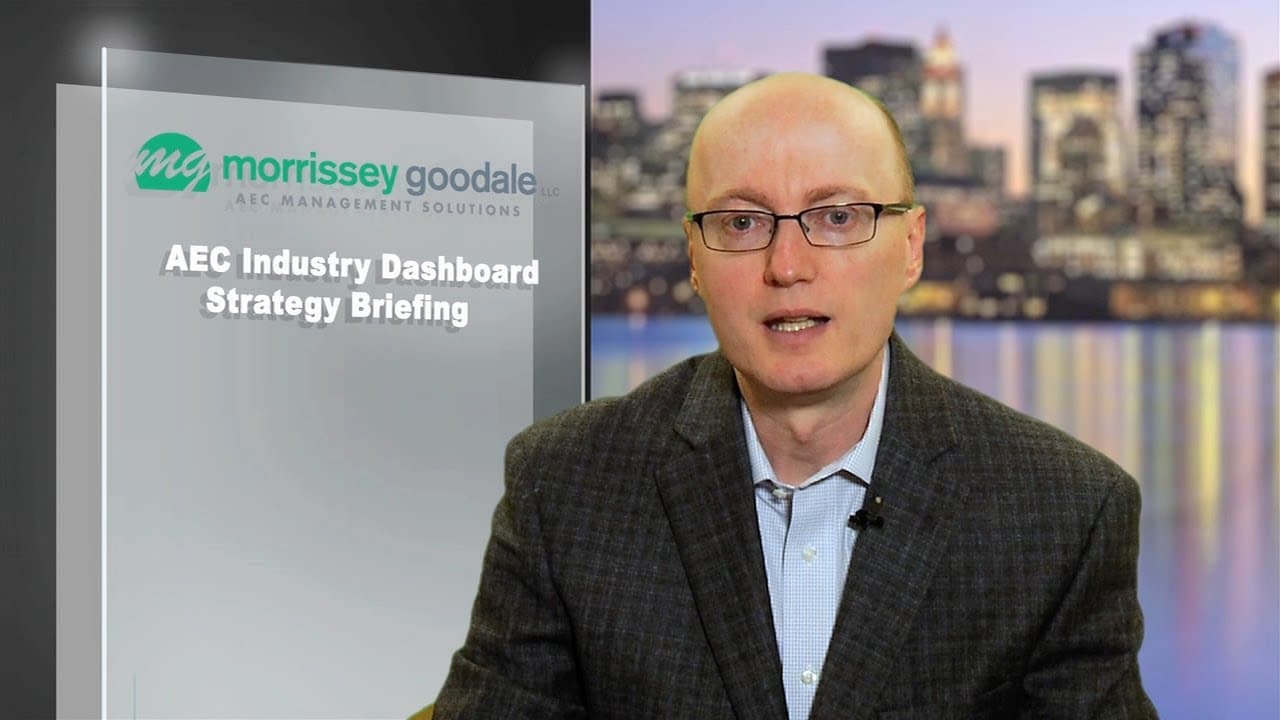AE Industry Dashboard > Volume 9 Issue 3
AE Industry Dashboard: Volume 9, Issue 3
Bringing you snapshots of key market sectors, business management ideas, and must-know information for managing and leading your firm.

In This Issue
strategy briefing
Market Watch
Technology Corner
The New Workplace
strategy briefing
Busy or Not Don’t Stop Marketing
The majority of firms we speak with are far less concerned about where their next meal is coming from than how they are going to actually eat it. The prospect of adequately staffing projects is a far greater risk than the ability to win work. But while no amount of finger wagging about an eventual economic downturn will convince any of you to suddenly floor the marketing gas pedal…

Market Watch
The Future is Now for Smart Cities
Getting real-time
Advancements in high-speed wireless networks and the Internet of Things have propelled the growth of so-called “smart cities,” which employ real-time data to enhance the economic, social, and environmental well-being of residents and improve the functionality of public services such as transit, solid waste, power, water and wastewater, lighting, and street maintenance. For instance, Seoul, South Korea, employs sensors in trash cans that signal when they need to be emptied, and Chicago has installed sensors on 270,000 street lights that send alerts when replacement bulbs are needed.
Doubling up
The imminent roll-out of 5G ultrahigh-speed wireless networks will further spur the growth of smart cities. According to global market research firm International Data Corporation (IDC), spending on smart cities initiatives will total $95.8 billion in 2019, up more than 17% from 2018, with spending in Singapore, New York City, Tokyo, and London expected to surpass $1 billion. IDC also forecasts that smart cities expenditures will nearly double to $189.5 billion in 2023 with resilient energy and infrastructure, data-driven public safety, and intelligent transportation projects accounting for more than half of the spending.
Engineering demand
Technology firms aren’t the only companies profiting from the growth of smart cities. “Much of the funds for smart cities are mostly going to engineering professionals and consultants for research,” reports American City & County. In particular, smart cities initiatives have increased demand for urban planning, asset management, energy efficiency, and geospatial services. Engineering News-Record reports, however, that design firms are encountering competition from advisory and management consulting firms.
The great beyond
Consulting engineering firm Pennoni has pursued smart cities projects by forming relationships beyond the AEC industry. In addition to enrolling as an associate partner with the Smart Cities Council, the firm has partnered with companies such as Momentum Dynamics, which develops charging technologies for the automotive and transportation industries, and Roadbotics, which captures data on road conditions, as well as economic consulting firm Econsult Solutions to produce research studies on smart cities.
Technology Corner
The 5G Revolution Is Nearly Here
The waiting game
The long wait for the deployment of the fifth generation of mobile networks—known as 5G—is nearly over. Telecommunications providers have started to roll out 5G service, which is expected to be up to 100 times faster than 4G technology, in select cities, and widespread implementation is anticipated to occur in 2020. A 2018 report from international telecommunications giant Ericsson forecasts that 5G networks will cover 40% of the world and handle a quarter of all mobile data traffic by 2024.
Change up
The next generation of cellular technology will change the speed of doing business. With real-time data speeds approaching 10 gigabytes per second, 5G networks will be fast enough to download a high-definition movie to a smartphone in only two seconds. For AEC firms, the faster speed, greater bandwidth, and more reliable connection will make it easier to share large files in the cloud, even on mobile devices, and improve the seamlessness of working remotely.
Market driver
The rise of 5G will further spur the growth of smart cities by permitting the connection of several million Internet of Things devices per square mile as opposed to several thousand under 4G technology. This will drive the proliferation of drones, autonomous vehicles, and artificial intelligence, and it will require designers to incorporate greater automation into buildings and transportation systems. Near-zero latency on 5G networks and the ability to pinpoint the geolocation of devices to a matter of inches could also transform construction jobsites by allowing cranes and other equipment to be operated remotely from hundreds of miles away.
Price to be paid
Faster speeds will come at a price, however. Customers will not only pay more for 5G services but will need to purchase new smartphones with new antennas in order to access 5G networks.
The New Workplace
How to Hire for Soft Skills
The softer side
As the business world becomes increasingly automated, it’s ironic that demand is growing for employees who possess the human touch. According to LinkedIn’s 2018 U.S. Emerging Jobs Report, 4 of the top 10 sought-after skills among employers are so-called “soft skills”—oral communication, people management, time management, and leadership. According to the study, 92% of executives report soft skills are equally or more important than technical skills, and 89% say it’s difficult to find people with soft skills. “The biggest skills gap the United States is soft skills,” says LinkedIn CEO Jeff Weiner.
Beyond words
Soft skills are particularly critical in a client-interfacing sector such as the AEC industry. While experience and technical skills can be as black-and-white as words on a resume, how do you identify more amorphous soft skills in job candidates? In addition to assessing oral communication skills in interviews, give candidates writing tests. Some firms also require job candidates to complete personality and behavioral assessments.
The big asks
When writing job descriptions, include the soft skills that are required for those positions and then probe job candidates for specifics during interviews. Ask them to describe experiences collaborating with someone with a different perspective and how they overcame mistakes. Ask how their values align with your firm’s values and mission. Do they describe failures without shirking blame? Do they demonstrate resilience and empathy for co-workers? Assess their problem-solving and creativity skills by asking how they would approach a recent problem encountered by your firm. Ask similar questions of references.
Question the questioners
Interviewees also need to ask themselves questions about job candidates after their meetings. Did prospective hires act professionally? Would you be comfortable putting them in front of clients to represent the firm? How did they treat the receptionist on first entering the office? Did they appear enthusiastic? Did they demonstrate time management and reliability by being punctual? Did they ask questions about your company that indicate they did their research? Did they maintain eye contact and engage in active listening? These questions should give sufficient insight to gauge a candidate’s soft skills.
Subscribe to our Newsletters
Stay up-to-date in real-time.










